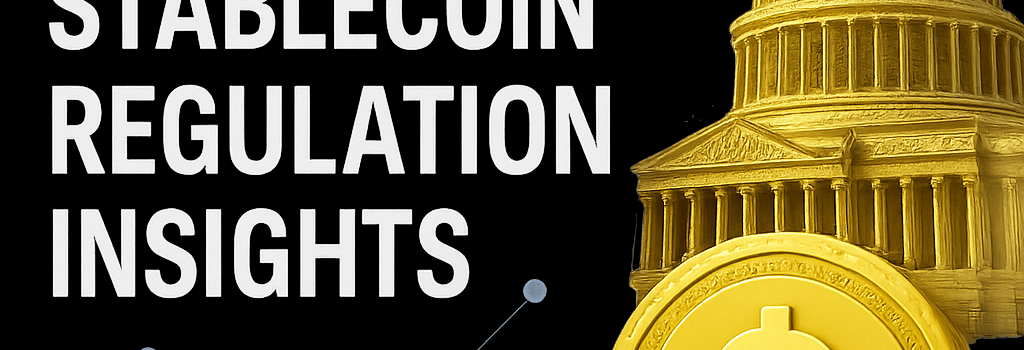Senate Passes GENIUS Act: Stablecoin Regulation Insights

Overview
On June 17, 2025, the Senate approved the GENIUS Act (Global Economic Network Improvement for U.S. Stability), landmark legislation designed to bring dollar-pegged stablecoins under comprehensive federal oversight. Supporters argue it will bolster consumer protections, introduce rigorous anti-money laundering (AML) and combating the financing of terrorism (CFT) controls, and integrate crypto markets with traditional finance. Detractors—led by Sen. Elizabeth Warren and Sen. Jeff Merkley—contend the bill contains dangerous loopholes that could enable conflicts of interest, particularly for former President Donald Trump and his crypto-linked enterprises.
Key Provisions of the GENIUS Act
- Reserve Requirements: 100% backing in U.S. Treasury securities, cash, or high-quality commercial paper.
- Redemption Guarantees: 24/7 immediate redemption with a 2-second settlement SLA in 95% of transactions.
- Audit & Attestation: Quarterly SSAE 18 reports by independent accounting firms; real-time reserve monitoring via blockchain explorers.
- Smart Contract Security: Mandatory formal verification and third-party penetration testing for ERC-20 and cross-chain implementations.
- Regulatory Coordination: Harmonization with FATF guidance, Basel Committee standards, and SEC/CFTC authority splits.
Conflict-of-Interest Concerns
Despite banning current officials from launching new stablecoins, the Act does not strip benefits tied to prior holdings. Critics highlight Trump’s stake in World Liberty Financial—which recently issued the USD1 stablecoin—and MGX’s $2 billion Binance investment executed using USD1.
“Why, beyond seeking favor with the Trump administration, was USD1 chosen over established tokens?” asked Sens. Warren and Merkley in a May letter to MGX and World Liberty Financial.
Technical Deep Dive: Stablecoin Mechanics
Under the GENIUS Act, stablecoin issuers must implement:
- On-chain Transparency: Public dashboards on Ethereum or permissioned sidechains reporting real-time collateral ratios.
- Oracle Integrity: Use of decentralized oracle networks (e.g., Chainlink) for secure, tamper-resistant USD price feeds.
- ISO 20022 Messaging: Standardized payment messaging for interoperability with global banking rails.
- Disaster Recovery: Cold-storage failover, multi-region node replication, and cryptographic key-sharding for fault tolerance.
Global Regulatory Context
Europe’s MiCA regulation, effective February 2025, instituted parallel reserve and governance rules, while the Bank of England explores a central bank digital currency (CBDC). China’s digital yuan pilots have accelerated, raising the stakes for U.S. digital currency policy. The GENIUS Act aims to align with Basel Committee liquidity coverage ratio guidelines and FATF AML/CFT recommendations.
Conflict Mitigation Measures & Loopholes
Key concerns remain:
- Quid Pro Quo Risks: Foreign investors could exchange stablecoin holdings for tariff exemptions, pardons, or appointments.
- Opaque Payouts: Layered transactions may cloak bribes or kickbacks—particularly via cross-border bridges.
- Executive Exemptions: No retroactive divestment requirement for pre-existing assets, preserving Trump’s financial interest.
Expert Opinions
Rebecca Turner, former SEC counsel: “Without mandatory divestiture, the Act codifies a conflict-of-interest exception that erodes public trust.”
Dr. Miguel Alvarez, fintech researcher at Stanford: “Robust smart-contract audits and real-time oracles are promising, but governance models must explicitly address top-level entanglements.”
Additional Analysis
Risk Scenarios & Stress Testing
Analysts recommend simulation of a sudden run on stablecoins, examining liquidity coverage ratios, margin calls across DeFi lending platforms, and cross-chain bridge vulnerabilities that could trigger systemic cascades.
CBDCs vs. Private Stablecoins
The interplay between a potential Fed CBDC and private stablecoins raises issues of privacy, programmable money, and monetary policy levers—dynamics the GENIUS Act does not fully address.
Legislative Outlook
The House is likely to debate amendments on anti-corruption safeguards and expanded interoperability with DeFi protocols. While some House Republicans seek broader market frameworks, many Democrats insist on closing ethical gaps before forwarding the bill to the President’s desk. A final vote is anticipated by late July under strong White House pressure.
Conclusion
The GENIUS Act marks a significant step toward regulatory clarity for stablecoins but leaves unresolved the very conflicts of interest it purports to prevent—highlighting the tension between fostering innovation and enforcing ethical governance in the digital age.